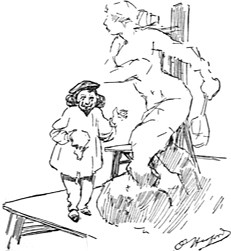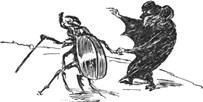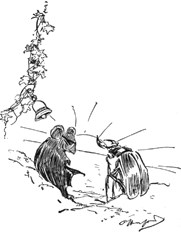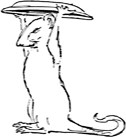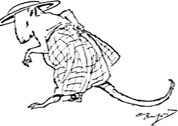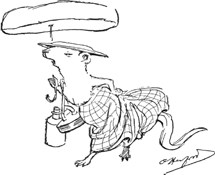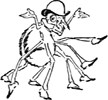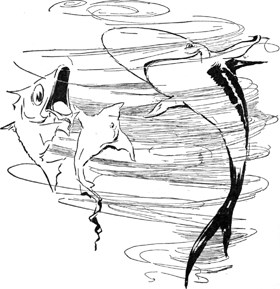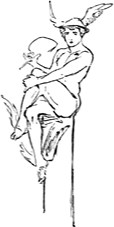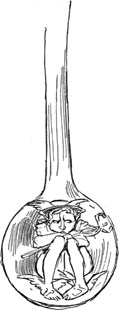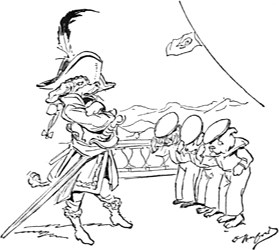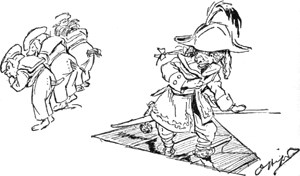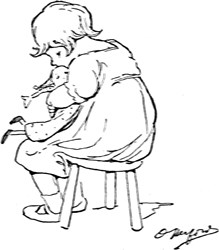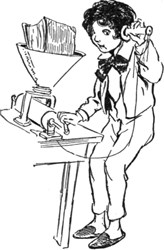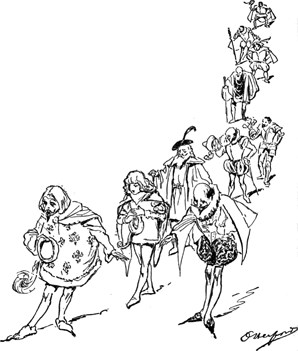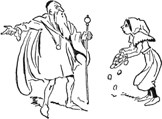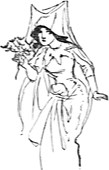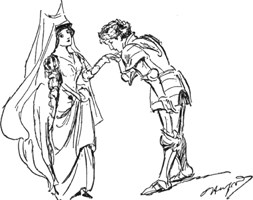Found Wanting
There lived a wondrous sculptor once, a genius in his way,Named Phidias Praxiteles Canova Merryday.He sat within his studio and said, “I really mustBegin a Rhodian anaglyptic ceroplastic bust.“My customers demand them, their fame rings near and far,But then, alas, the trouble is, I don’t know what they are.Though I could carve a Venus or a Belvedere with ease,My wondrous skill is lacking when it comes to carving these.“I cast and cut and chisel, I model and I mould,I copy poses picturesque from studies new and old;In marble, bronze, and potter’s clay, in wax and wood and stoneI carve the old-time statues with improvements of my own.“I have Apollo on a horse, Minerva on a wheel,Hercules going fishing with his basket and his creel.A Mercury on roller-skates, Diana with a hat,And Venus playing tennis with Achilles at the bat.“Yet these my customers pass by, and ask with interest keen,For things with long and tiresome names,—I don’t knowwhat they mean.And so I let my hammers hang, and let my chisels rust,For I cannot do an anaglyptic ceroplastic bust.”A Tragic Tale of Tea
The Beetle was blind, and the Bat was blinder,And they went to take tea with the Scissors-grinder.The Scissors-grinder had gone awayAcross the ocean to spend the day;But he’d tied his bell to the grapevine swing.The Bat and the Beetle heard it ring,And neither the Beetle nor Bat could seeWhy no one offered them any tea.So, polite and patient, they’re waiting yetFor the cup of tea they expect to get.The Erratic Rat
There was a ridiculous RatWho was awfully puffy and fat.“I’ll carry,” he said,“This plate on my head,’Twill answer in place of a hat.”And then he remarked with a frown,“I suppose that I must have a gown;I’ll make me a kiltOf this old crazy-quilt,To wear when I’m going to town.“And of course, though the weather is warm,It may be there’ll come up a storm;An umbrella I’ll makeOf a caraway cake,It’ll match with my whole uniform.And I’ll carry a bottle of inkIn case I should wish for a drink;And this flat-iron so sweetI’ll take with me to eat,And now I am ready, I think.”The Two Friends
A Spider and a Centipede went out to take a walk;The Centipede said frankly, “I will listen while you talk,But I may appear distracted, or assume a vacant stare,Because to keep my feet in step requires my constant care.”Said the Spider: “I appreciate your most peculiar case,And your feet must be quite handy when you want to run a race;But though you gain in some ways, in some other ways you lose;And, of course, my friend, you must be quite extravagant in shoes.”“Ah! yes. Ah! yes,” a heavy sigh escaped the Centipede;“And I have other trials, too;—my life is hard indeed!Why, sometimes when I’m very tired, a long, long time it takesTo ascertain with certainty which foot it is that aches.“And when I go to dancing-class on Saturdays at three,I find the First Position very difficult for me.Though I put my best foot foremost, and good time I try to keep,To my chagrin, I often find a foot or two asleep.Athletics I attempted, but, alas! I must admitThat every exercise I tried I put my foot in it.I think I’ll join a foot-ball team,—as many friends suggest,—Before I’ve one foot in the grave and gout in all the rest.But now I’ll say good-morning; for, my friend, I have to stopTo get my boots blacked neatly at this little boot-black’s shop;And, as you may imagine, it will keep me here some time,But, what is worse, I’ll have to pay him many a hard-earned dime.”The Spider said good-morning, and pursued his way alone,And as he went he murmured, in a thoughtful undertone:“I’m a happy little Spider, and I’m very glad indeed,That I was born an octoped and not a centipede!”The Smiling Shark
There was an old Shark with a smileSo broad you could see it a mile.He said to his friends,As he sewed up the ends,“It was really too wide for the style.”The Mercury’s Plaint
I don’t know why I’m slandered so,If I go high,—if I go low,—There’s always some one who will say,“Just see that mercury to-day!”And whether toward the top I crawlOr down toward zero I may fall,They always fret, and say that IAm far too low or far too high.Although I try with all my might,I never seem to strike it right.Now I admit it seems to meThey show great inconsistency.But they imply I am to blame;Of course that makes my anger flame,And in a fiery fit of piqueI stay at ninety for a week.Or sometimes in a dull despair,I give them just a frigid stare;And as upon their taunts I thinkMy spirits down to zero sink.Mine is indeed a hopeless case;To strive to please the human race!The Pirate Poodle
Once there was a Pirate Poodle,And he sailed the briny seasFrom the land of Yankee DoodleSouthward to the Caribbees.He would boast with tales outlandish,Of his valor and renown;And his cutlass he would brandishWith a fearful pirate frown.So ferocious was his mannerAll his crew looked on, aghast;And his fearful pirate bannerFloated from his pirate mast.He reiterated proudlyNaught had power to make him quail;Yet when thunder roared too loudlyHe would turn a trifle pale.And he turned a little palerWhen there came a sudden squall;For this funny little sailorWas ridiculously small.And whene’er a storm portendedHe’d betake himself below.So much fear and courage blendedDid a pirate ever show?An Old Love
Priscilla, Auntie’s promised meA brand-new Paris doll;And though I love you, yet you seeI cannot keep you all.Nursey declares I really mustThrow one of you away;And you’re the oldest, so I trustYou will not care to stay.You’ve lost an arm, your dress is torn,Your wig is all awry;Priscilla, you are so forlorn,We’ll have to say good-by.And yet—oh, don’t! my dolly dear,Don’t look so sad, I pray!You precious dolly, come right here,You shan’t be thrown away!You’re ragged, yes, and lame and blind,You’re really but a wreck;But, dear Priscilla, never mind,I do not care a speck.Your eyes do nicely when they’re shut,And I can mend the rest;Well—p’raps I’ll love the new one—butI’ll always love you best.Bobby’s Pocket
Our Bobby is a little boy, of six years old, or so;And every kind of rubbish in his pocket he will stow.One day he thought he’d empty it (so he again could stock it);And here’s an alphabet of what was found in Bobby’s pocket.A was a rosy Apple, with some bites out, here and there;B was a bouncing rubber Ball that bounded in the air.C was a crispy crusty Cake with citron on the top;D was a dancing Donkey that could jump around and hop.E was a little robin’s Egg, all speckled blue and brown;F was a fluffy Feather that was white and soft as down.G was a lively Grasshopper, whose legs and wings were green;H was a grimy Handkerchief that once perhaps was clean.I was a plaster Image that had lost its plaster head;J was a jolly Jumping-Jack all painted blue and red.K was a keen and shining Knife, ’twould cut the toughest bark;L was a little wooden Lion, strayed out of Noah’s Ark.M was a Marble, large and round, with colors bright and clear;N was a bent and rusty Nail, of little use, I fear.O was a tiny Oil-can, which was always upside down;P was a Penny Bob had saved to spend some day in town.Q was a Quilted ear-tab, which had lost its velvet mate;R was a Ring with a glassy gem of wondrous size and weight.S was a String, a piece of Soap, a Stone, a Sponge, a Stick;T was a lump of Taffy, exceeding soft and thick.U, an Umbrella-handle, of silver-mounted horn;V was a comic Valentine, a little creased and worn.W was some sticky Wax, lovely to pinch and mould;X was an old Xpress receipt, worn out in every fold.Y was a lot of Yellow Yarn, all bunched up like a mop;Z was a jagged piece of Zinc, found in a plumber’s shop.All these are Bob’s possessions; he loves every single thing;And owning all these treasures he’s as happy as a King!The Instructiphone
There was a youthful genius once, a boy of thirteen years,Named Cyrus Franklin Edison Lavoisier De Squeers.To study he was not inclined, for fun he had a bent;But there was just one article he wanted to invent.“It’s a sort of a contraption which will work itself,” he said,“And, without studying, will put my lessons in my head.”He thought and puzzled o’er his plan, he worked with might and mainTo utilize the wondrous schemes within his fertile brain:Until at last the thing was done, and to his friends said he:“It is the wonder of the age! Success I can foresee!My great invention is complete, and—’tis no idle vaunt—I’m sure that my Instructiphone will fill a long-felt want.“The action is quite simple—I will try to make it clear:This funnel-shaped receiver I apply to my left ear;Then in this hopper I will put whate’er I wish to learn—A page of history or of Greek,—and then this crank I’ll turn.“The topic goes into this tube, a sort of phonographWhich acts directly on my mind,—it does, you needn’t laugh!I do not have to think at all, for, as I pull this chain,My wonderful machine transmits the knowledge to my brain.”The plan was good, the works were fine, and yet there was a flaw;When Cyrus turned the crank around, the neighbors watched with awe.He confidently pulled the chain with motion quick and deft;The knowledge entered his right ear—and came out at his left.He tried again,—a page of Greek; he tried a theme occult,—A message and an errand,—every time the same result!Then Cyrus knew that somehow his machine had missed its aim;For though the works ran smoothly it was always just the same.No matter what the book might be, or what it was about,It would go in at one ear,—at the other ’twould come out!So in his laboratory, baffled Cyrus sitting lone,Strives to correct the sad defect in his Instructiphone.But it is my opinion, there’s no fault in the machine:The trouble is that Cyrus is like other boys I’ve seen.The Lay of the Lady Lorraine
The Lady Lorraine was sweet and fair;The Lady Lorraine was young;She had wonderful eyes and glorious hair,And a voice of a cadence rich and rare;Oh, she was a lady beyond compare—By all were her praises sung,Till valley and plainTook up the refrain,And rang with the praise of the Lady Lorraine.And besides all charms of form and face,There were other attractions about Her Grace;Besides her delicate, lily-white hands,She had rolling acres and broad, rich lands;Besides her patrician coat of arms,She had far-reaching forests and fertile farms;And of many an ancient and wide domainThe beautiful lady was châtelaine.So of course at her doorThere were suitors galore;They came by the dozen, and came by the score.They came in droves, and they came in hordes,Titled nobility,—princes, lords,Dukes and marquises, viscounts and peers,Ambassadors, marshals, grandees, grenadiers,Barons and baronets, earls, and esquires,Illustrious sons of illustrious sires:But ’twas ever in vainThey sought to attainThe heart and the hand of the Lady Lorraine.And day after dayThey turned sadly away;For the Lady Lorraine continued to say,Decidedly, certainly, stubbornly, “Nay!”She cared not for wreaths of laurel or bay,Their titles or rent rolls or uniforms gay,Their medals or ribbons or gaudy display,Their splendid equipment, demeanor, or bearing;She observed not their manners, nor what they were wearing;Their marvellous exploits for her had no charms:Their prowess in tourney, their valor at arms;Their wondrous achievements of brawn or of brain,—All, all were as naught to the Lady Lorraine.To each suitor she’d say, with her hand on her heart,“Sir, I ask of you only that you will depart.”In vain they entreated, they begged and they plead,They coaxed and besought, and they sullenly saidThat she was hard-hearted, unfeeling, and cruel.They challenged each other to many a duel;They scowled and they scolded, they sulked and they sighed,But they could not win Lady Lorraine for a bride.Now the reason for this, as you may have divined,Was because in her maidenly heart was enshrinedThe image of one who was just to her mind:Who was loving and kind,To whose faults she was blind,—The lord of her heart, and the love of her life,To whom she had promised to be a fond wife.Her Highness was happy, for even now heWas hastening to her across the blue sea.He had written to say he was then on the way,And would greet his fair lady on Christmas day.’Twas Christmas eve. In the old oak hallPreparations were made for the Christmas ball.Gay garlands were hung from ceiling and wall;The Yule log was laid, the tables arrayed,And the Lady Lorraine and her whole cavalcade,From the pompous old steward to the scullery-maid,Were all in a fluster,Excitement and bluster,And everything shone with a marvellous lustre.Such savory viands the larders presented;Such wondrous confections the bakers invented:Such pasties and cates of eccentric design;Such sparkling decanters of rarest old wine;And ready at hand was the great wassail-bowl,And the jolly old boar’s head, with lemon, so droll.The nook for musicians was carefully planned,And carols and glees would be played by the band.At last all was ready. The workmen were done;And awaiting the jollity, mirth, and frivolity,The games and the dancing, the feasting and fun,The old hall was empty,—save only for one,—The Lady Lorraine, who surveyed it with pride,And said, “It is worthy of Lord Cecil’s bride!”Then a bright smile illumined her happy young face,Her roguish eyes twinkled, and gayly Her GraceCrossed the old polished floor with a step light and quick,And her high slipper heels went clickety-click.She looked cautiously round,—she was all by herself;Like a mischievous elf,She took from a shelfA mistletoe spray with its berries like pearls;Then tossing her head and shaking her curls,In a manner half daring and yet half afraid,The madcap maid, with a smile that betrayedExpectant thoughts of her lover dear,Fastened the spray to the chandelier.Then in a merry, fanciful mood,Inspired by the time and the solitude,The Lady Lorraine,In whimsical vein,Said, “On Christmas eve, ’neath this mistletoe bough,I’ll solemnly make an immutable vow.”With a glance at the portraits that hung on the wall,She said, “I adjure ye to witness, all:I vow by the names that I’ve long revered,—By my great-great-grandfather’s great gray beard,By my father’s sword, by my uncle’s hat,By my spinster aunt’s Angora cat,By my ancient grandame’s buckled shoes,By my uncle Gregory’s marvellous brews,By Sir Sydney’s wig,And his ruff so big,—Indeed, by his whole preposterous rig,—By the scutcheon and crest, and all the restOf the signs of my house, I vow this vow:That whoever beneath this mistletoe boughShall first kiss me, he—none but he—My partner for life shall henceforth be.”
She had scarcely ceased when she heard a sound.She looked around,And, startled, foundFrom the old oak chimney place it came.For there, as if in an old oak frame,A figure quaint, yet familiar too,Met her astonished, bewildered view.Of aspect merry, yet something weird,With kind blue eyes and a long white beard,Fur-trimmed cloak, and a peakèd cap,Rosy cheeks,—a jolly old chap;And, though surprised, she recognizedSt. Nicholas, dear to her childhood days,And she met his smile with a welcome gaze.The jolly old man beheld Her Grace,With her laughing eyes and her winsome face;He couldn’t resist her,—Indeed, who could?—And he heartily kissed herWhere she stood!And exultingly cried, “I heard your vow;And Lady Lorraine shall be my bride now!”The lady trembled, as in a daze;With a startled gaze of blank amaze,She looked at the figure who stood by her sideAnd audaciously claimed her for his bride.Then she bowed her headAnd the color fledFrom the cheeks that his kiss had flushed rosy red.Her heart was filled with a sad despairAs she thought of her lover, Lord Cecil Clare,And his dire dismayWhen on Christmas dayHe should ride up gayly in brave array,And find his sweetheart stolen away.But the honor and pride of her race were at stake;And for conscience’ sakeShe dared not breakHer solemn vow, though her heart might ache.To be true to her word, her sire had taught her,And she was a loyal, obedient daughter.She appealed to the portraits of squires and dames,Who looked sternly down from their gilded frames;But they seemed to say, “There must ne’er be brokenA promise or vow a Lorraine has spoken.”With stifled sighs, and with tears in her eyes,Though she tried to assume a cheerful guise,She turned to the suitor who stood apart,Awaiting the gift of her hand and heart;And she said with a gentle, dignified air:“My heart belongs to Lord Cecil Clare;But my fatal vow,Though I rue it now,I dare not break. So, at your command,I fulfil it! On you I bestow my hand.”“O noble lady!” her suitor cried,“’Twas only a merry test I tried.Full well I knewThat your heart was true.Behold your lover, my bonny bride!I assumed this guise for a Christmas joke.”And as he spoke,He threw off his cloak,He flung to the floor his peakèd hood,And a gallant knight before her stood!He doffed his wig and his long white beard;All signs of St. Nicholas disappeared;And smiling there, in the firelight’s glare,Was the gay and noble Lord Cecil Clare!The lady marvelled—a glad surpriseBetokened itself in her lovely eyes;And with her merriment quite restored,She said, “You are welcome home, my lord;And I’m thankful, now,That I kept my vow.”Lord Cecil raised her hand to his lips,And gallantly kissed her finger tips;While the squires and damesLooked down from their frames,And “Bless you, my children!” they seemed to say.Then the band appeared, and began to play;The guests arrived, and without delayThe fun commenced, and the old oak hallNever had known such a Christmas ball!The feast was spread,And the dance was ledBy the knight and the lady, and every one said,With a shout that rent the midnight air,“Long live Lord Cecil and Lady Clare!” полная версия
полная версия
